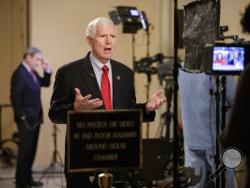WASHINGTON (AP) — Showdown day at hand, Republicans remained short of votes Thursday for their showpiece health care overhaul, hoping for President Donald Trump to close the deal with balky conservatives at a White House meeting.
Frenzied last-minute wheeling and dealing was underway on Capitol Hill and at the White House, but if there was any change it seemed the number of dissidents was growing. Signaling that more work was needed, GOP leaders postponed a planned morning meeting of rank-and-file lawmakers, and House Speaker Paul Ryan delayed a scheduled news briefing.
Republican Rep. Jaime Herrera Beutler of Washington state became the latest to declare her opposition. Concessions being offered to the conservatives — they want to limit requirements that health plans offer benefits including maternity and substance abuse care — appeared to be scaring off moderate Republicans.
The House Freedom Caucus, whose conservative members comprise the bulk of GOP opponents, was set to attend a midday meeting with Trump. But the head of that group, Rep. Mark Meadows, R-N.C., warned that it would be a "Herculean task" to resolve their differences quickly.
"An agreement is needed from my party," Rep. Pete Sessions, R-Texas, said during a procedural debate on the House floor. He said the GOP "intends to bring forth an agreed-to bill that we will be able to show to the American people, and we will own it."
The stakes could hardly be higher for a party that gained monopoly control of Washington's power centers in part on promises to get rid of President Barack Obama's signature legislative achievement and replace it with something better. Now Republicans are staring at the possibility of failure at the moment of truth, an outcome that would be a crushing political defeat for Trump and Hill GOP leaders and would throw prospects for other legislative achievements into great uncertainty.
Obama declared in a statement that "America is stronger" because of the current law and Democrats must make sure "any changes will make our health care system better, not worse for hardworking Americans." Trump tweeted to supporters, "Go with our plan! Call your Rep & let them know."
The Republican legislation would halt Obama's tax penalties against people who don't buy coverage and cut the federal-state Medicaid program for low earners, which the Obama statute had expanded. It would provide tax credits to help people pay medical bills, though generally skimpier than Obama's statute provides. It also would allow insurers to charge older Americans more and repeal tax boosts the law imposed on high-income people and health industry companies.
The measure would also block federal payments to Planned Parenthood for a year, another stumbling block for GOP moderates.
Tension has been building in advance of the critical vote, and a late-night meeting of moderate-leaning members in Speaker Ryan's office Wednesday broke up without resolution.
One lawmaker present, GOP Rep. Ryan Costello of Pennsylvania, said members had been asked to weigh in on the changes being offered to the Freedom Caucus. He said, "The Freedom Caucus has presented what it will take for them to make some 'yeses,' and I think there are a lot of members who will now have to evaluate things a little bit further."
Shortly thereafter a key moderate who had been in the meeting, Rep. Charlie Dent of Pennsylvania, issued a statement saying he would be voting "no" on the health bill. "I believe this bill, in its current form, will lead to the loss of coverage and make insurance unaffordable for too many Americans," said Dent, a leader of the Tuesday Group of moderate-leaning Republicans.
Thursday's White House meeting between Trump and Freedom Caucus members looked to be pivotal as to whether the vote could go forward as planned. Trump has played an increasingly central role, repeatedly summoning different groups of lawmakers to the White House, traveling to the Capitol himself and calling others on the phone.
And congressional leaders have increasingly put the onus on the president to close the deal, seemingly seeking to ensure that he takes ownership of the legislation — and with it, ownership of defeat if that is the outcome.
In a count by The Associated Press, at least 28 Republicans said they opposed the bill, enough to narrowly defeat the measure.
But the number was in constant flux amid the eleventh-hour lobbying.
Including vacancies and expected absentees, the bill would be defeated if 23 Republicans join all Democrats in voting "no."
In a show of support for the opponents, the conservative Koch network promised Wednesday night to spend millions of dollars to help House members who vote against the health care bill.
Moderates were given pause by projections of 24 million Americans losing coverage in a decade and higher out-of-pocket costs for many low-income and older people, as predicted by the nonpartisan Congressional Budget Office.
___
By ERICA WERNER and RICARDO ALONSO-ZALDIVAR, Associated Press
___
Associated Press reporters Alan Fram, Kevin Freking and Ken Thomas contributed to this report.

